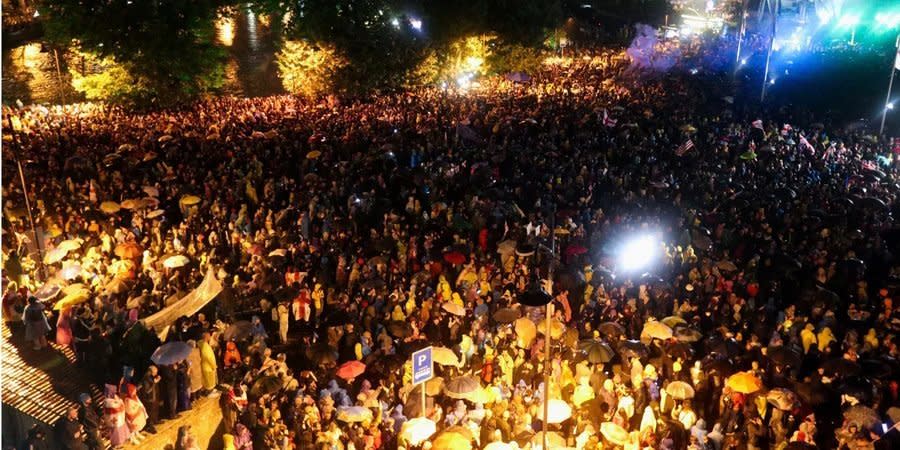EU examines Georgian 'Russian Law' impact on integration

- Oops!Something went wrong.Please try again later.
Foreign ministers from 12 EU nations seek insights into how the 'foreign agents' law in Georgia will impact its European integration, Echo of the Caucasus reported, citing a statement released by the ministers on May 13.
Ministers urged EU Foreign Policy Chief Josep Borrell and European Commissioner for Neighborhood and Enlargement Policy Oliver Varhelyi to promptly provide details on how Georgia's "foreign agents" law might impact the nine-step process for its EU accession.
Read also: Students from Georgia's main universities announce mass strike to join anti-'Russian law' protests
Expressing deep concern over Georgia's swiftly deteriorating situation, ministers from Czechia, Denmark, Estonia, Finland, France, Germany, Latvia, Ireland, Lithuania, the Netherlands, Poland, and Sweden emphasized the urgency of this assessment. They emphasized the need for this assessment to be made public before the final vote in the Georgian parliament.
European officials highlighted the "foreign agents" law as another alarming indicator of Georgia's regression in democracy and human rights.
Read also: Ukraine should take a closer look at what’s going on in Georgia — opinion
The ministers warned that the Georgian government's actions risk undermining the country's progress toward European and Euro-Atlantic integration.
Protesting the "foreign agents" bill in Georgia
Massive protests broke out throughout Georgia on April 9 following the Georgian Dream party's proposal to reintroduce a contentious "foreign agents" bill, previously known as the "Russian law," which faced significant opposition in 2023.
Security forces in Tbilisi dispersed demonstrators on April 16.
The Georgian legislature approved the bill in its initial reading on April 17. The proposed legislation mandates that non-profit organizations and media outlets receiving over 20% of their funding from foreign sources register as "organizations acting in the interests of a foreign state."
For the bill to become law, it must pass three votes in the Georgian parliament.
Georgian President Salome Zourabichvili has vowed to veto the bill.
Georgian Prime Minister Irakli Kobakhidze stated on April 18 that the bill aims to prevent the "Ukrainization" of the country.
In response, Ukraine's Foreign Ministry countered that the real threat to Georgia is Russification, not "mystical Ukrainization," emphasizing that derogatory references to Ukraine damage Ukrainian-Georgian relations.
Read also: Ukraine should take a closer look at what’s going on in Georgia — opinion
Members of the European Parliament expressed concerns that the bill could hinder Georgia's aspirations for Euro-Atlantic integration.
On April 25, the European Parliament adopted a resolution indicating that the "foreign agents" bill could impact Georgia's EU accession discussions while the law is in effect.
Clashes broke out between police and protesters near the Georgian parliament on April 30.
President Salome Zourabichvili demanded an end to the dispersal of protests in Tbilisi and held the government responsible for the unrest.
The Interior Ministry reported the arrest of 60 demonstrators on May 1, facing charges of hooliganism and disobeying police orders.
Six police officers sustained injuries during the clashes.
On the same day, the Georgian parliament approved the "foreign agents" bill in its second reading.
Legal Committee of the Georgian Parliament considered and supported the law on "foreign agents" in the third reading in 67 seconds on May 13.
We’re bringing the voice of Ukraine to the world. Support us with a one-time donation, or become a Patron!
Read the original article on The New Voice of Ukraine

